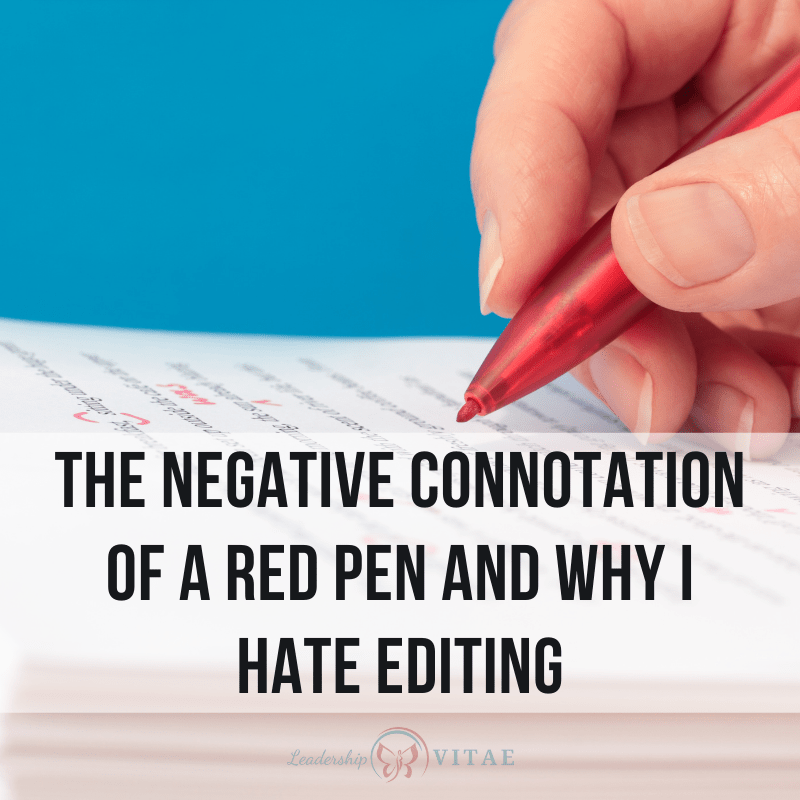
It’s been too many years to count, and I still remember like it was yesterday. Standing in front of Lloyd’s desk, having my email edited for the 3rd time.
Lloyd was my first manager. Email was a relatively new thing at the time and he was used to editing memoranda. He wanted every email printed and edited before it went out. With a red pen. It felt like school, only worse.
I was out for dinner recently with someone who writes professionally and is a former English professor. I shared the story of the dreaded red pen, and how it still causes me to hesitate when asked to edit anyone else’s work.
Usually, the story is a funny one. How I gave Lloyd back the print out, covered in red ink, after the 3rditeration. I told him if he wanted it to sound like him, he should send it.
I was 19 at the time. No mortgage or kids. No fear. It didn’t occur to me that I might get fired for insubordination. Or if it did, I was still naïve enough to think it wouldn’t have a long-term impact on my life and career.
In that moment, I was incensed and I wasn’t going to let it go.
Be intentional with what is edited
Lloyd wasn’t editing for grammar or content. He was editing for voice.
I stood up for my voice in that moment. He gave the print out back and told me I could send what I thought was best to my customers. He gave me permission to sound like me, instead to trying to make me sound like him.
It’s been decades. And it wasn’t until recounting the story to another writer – and editor – that I realized what was really going on in that moment.
It wasn’t the story of a micromanaging first boss. Of remembering how he make me feel, so that when it was my turn to lead I wouldn’t cause anyone else to feel that way.
It was the story of fighting for a voice in a room where only one voice had been allowed to be heard.
Because Lloyd wasn’t just editing my emails. He was taking my voice. And the voices of my peers.
I can still remember what would happen to the energy and voices in the room when he’d walk in. Ann was clearly the leader of the group of women in the Accounting office I worked in. She ran a tight ship.
Until he walked in. Suddenly, her voice was quiet. That red pen went well beyond email. He was red penning behaviors, interactions, processes…everything that went on in that room.
There is no pass or fail, only perspective
After pushing back on the dreaded red pen, I started to push back on other things. I wasn’t in the same position as the other women in the office. Less to risk or lose (at least not then).
I would change processes. Storage and filing systems. HOW things got done, not what.
At each turn, Ann and the other ladies would warn me “Lloyd isn’t going to like it.” Well, Lloyd didn’t do the work, did he?
I made sure I could justify what I was doing. As he confronted me on changes, I’d provide my reasoning. I’d get maybe an eyebrow raise, and then he’d go back to his office, leaving me to do my job how I saw fit.
There is never only one way to do anything. There are endless methods. As leaders, if we edit for our voice, our experience, and our way, we leave little room for anyone else’s. Losing the opportunity to innovate. To allow someone else’s ideas to be heard.
When our voice is the only one, the team can never grow beyond our perspective.
Edit while leaving room for learning
I still do not like to edit anyone else’s work. I try to be objective and only look for grammar and the ability to follow the story being told. Outside of that, I tend to leave the rest alone.
Why? Because who is to say that my way of telling the story is right or better? It might not be the way I’d tell it, but if the salient points are present, and the reader can follow along, isn’t that the point?
I also think that we learn a lot from trying. From using our voice and seeing how it lands. If it doesn’t get us the outcome we want, we’ll language differently the next time. We’ll adjust and improve.
Editing, whether it’s the written word or ideas, tends to focus on how one person thinks about our words, actions, or ideas. As a leader, being light on editing means leaving room for others to receive them. For the sender to learn what lands and what doesn’t. Without my input coloring the outcome.
When editing, context matters
Lest anyone think I just leave my team flying in the wind to figure things out on their own, that’s certainly not the case. If it’s something critical that doesn’t leave a lot of learn for learning as we go, I’ll offer up considerations or thoughts that I think are relevant.
There have also been times where my gut and prior experience tell me that we need to do “x” and it will be a horribly bad outcome if we don’t. However, I’ll always share context. Why is this edit relevant in this situation? What will it avoid or assist that matters in this moment?
That’s the difference between editing for content vs editing for voice. Letting someone know why helps with learning. Helps make for better content. Editing for voice limits what is brought to the table, rarely with a good why behind it.
Maybe that’s the real lesson I learned that day for my future as a leader. Edit lightly, focused on outcomes. If edits are needed, give context as to why, so that person can expand their thinking in future writings and ideas.
Have you ever been edited – your voice or your ideas? What suggestions would you make in how to respond? What do you wish leaders knew to make the environment more receptive? Please share your thoughts in the comments.








